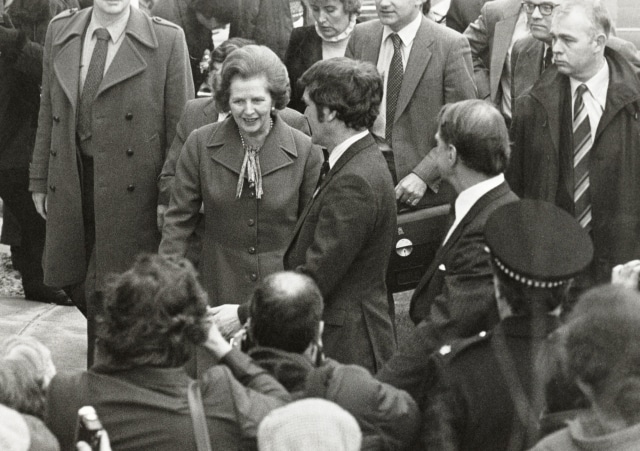Prime Minister Margaret Thatcher meets free market economist Friedrich von Hayek at IEA. She appoints Lord Lawson and they direct privatisation of British energy interests.
Thatcher arrived at the humble offices of the Institute of Economic Affairs in Lord North Street, a short walk from the Houses of Parliament, flushed with victory in the Conservative party leadership battle.
Ralph Harris ushered into the boardroom for a private audience with Friedrich von Hayek, the architect of her success.
The economist had recently been awarded the Nobel Prize, the highest honour for any academic, in part due to the consistent support of the institute.
This was the first time they had met and they talked for less than 30 minutes. Harris would recall: “Although she is known as being a rather overpowering lady she sat down like a meek schoolgirl and listened.
“And there was a period of unaccustomed silence from Margaret Thatcher. She said nothing for about ten minutes while he deployed his arguments”.
So Beautiful
The politician left and the economist was left in an “unusually pensive state” as the IEA staff gathered to see his reaction. “She’s so beautiful” he muttered.
Lawson would write some years later: “Margaret instinctively realized the need to regain the moral as well as the practical initiative from collectivism.
“In this she was strongly fortified by the writings of the economist and philosopher Friedrich Hayek.
“Although Hayek’s popularity was largely confined to non-mainstream bodies like the robustly free-market Institute of Economic Affairs, his warnings conformed very closely to recent British experience.”
Thatcher’s victory immediately rose the value of the IEA stock. No longer a fringe group of ideologues dismissed as fascists, they now had a disciple vying for the highest office in British politics.
Harris, a tireless fundraiser, was keen to bring home the advantage. He wrote to British American Tobacco and asked them to increase their donation to £5,000 a year.
On 13 May 1975 the BAT chairman’s policy committee received the following note: “It’s work has been increasingly relevant and influential.
“We have established good personal contact with its directors (Ralph Harris and John Wood) and could undoubtedly make more use of the institute’s knowledge of sources of economic information.”
Pander and Protect
But the IEA still represented a potential political risk due to the radical nature of its agenda. Linda Whetstone, the daughter of Antony Fisher, had followed closely in her father’s footsteps.
She became a trustee of the Institute of Economic Affairs and would even make a cameo appearance at the Conservative conference in October 1978 in the decaying seaside resort of Brighton.
The party was keen that the controversies of Powell and Joseph be forgotten and that it would attack Labour on economic rather than social grounds.
The theme of the conference was The Next Government. Linda had inherited her father’s clarity of thought and impatience with political pragmatism.
She took to the podium, wearing a crumpled canary yellow collared t-shirt, immediately in front of Margaret Thatcher and addressed assembled delegates in a clear, almost shrill voice.
“We have far too much legislation, too much rest and we must start undoing it,” she said:
“The next Conservative government must not pander or protect certain sectors. Let’s not go out of our way to help small businesses, agriculture trade unions, coloured people, women.”
She shouted: “I may be what people call a right wing Conservative but I believe we cannot help those people who cannot help themselves at the moment because we cannot afford to do it we cannot give them the choice in education, we cannot give them the choice in health care that some of us can afford and we cannot do it because we insist on trying to help different groups on trying to legislate against things all the time….”
Miners, oil, privatisation
Before she finished her speech the band started a rousing rendition of God Save the Queen, the audience took to its feet and her concluding remarks were, deliberately or otherwise, drowned out for the television viewers watching the conference at home.
Whetstone’s ideological distrust of the state would later inspire her to support free market attacks on climate science.
Thatcher was elected prime minister in May 1979 with an underwhelming government majority of 44 seats. But she was determined to immediately implement her free market agenda.
She made Howe chairman of a new special sub-committee to plan the mass privatisation of State assets with Lawson at his command.
Lawson was installed as energy secretary by October that year and began immediately the process of transferring control of the country’s vast oil and gas assets to private companies.
“I saw myself, quite simply, as having three main tasks: to bring to a successful conclusion the long struggle with the miners’ union…to pursue Britain’s interests in the international politics of oil; and privatization”.
Lawson would in the next decade sell off British Airways, British Petroleum and British Gas. The government would no longer have the power to transfer the country to renewables in a planned, orderly and relatively painless manner.
This could well be recognised by historians to come as the moment the British state lost any control over the emissions of greenhouse gasses from homes, offices and factories.
This is particularly poignant because the country as the birthplace of the industrial revolution has produced more carbon dioxide than any other.
If we had to hold one person solely responsible for our tragic state of affairs, would it be Lawson? Was this mass privatisation the cause of climate change, and therefore the cause of Lawson’s curious personal investment in remaining doggedly sceptical however certain the science would become?
Subscribe to our newsletter
Stay up to date with DeSmog news and alerts







